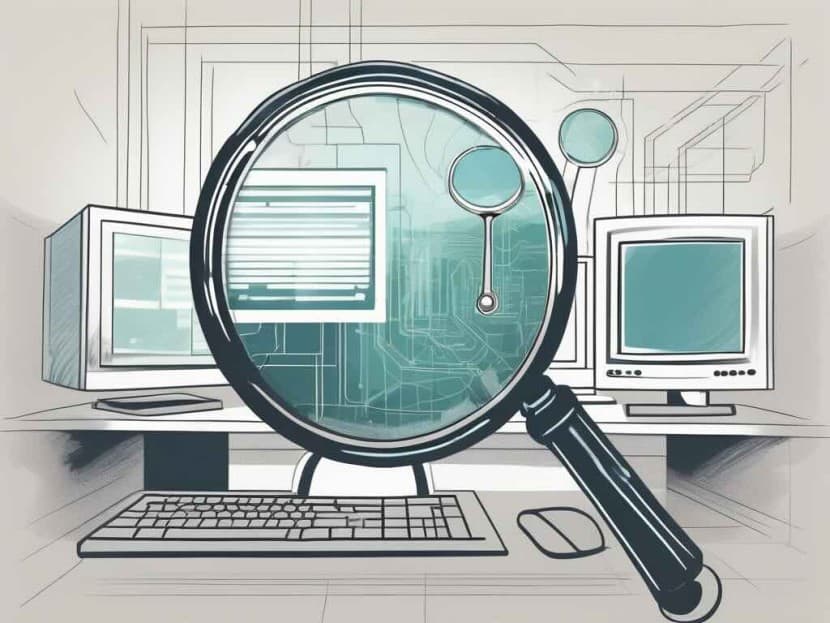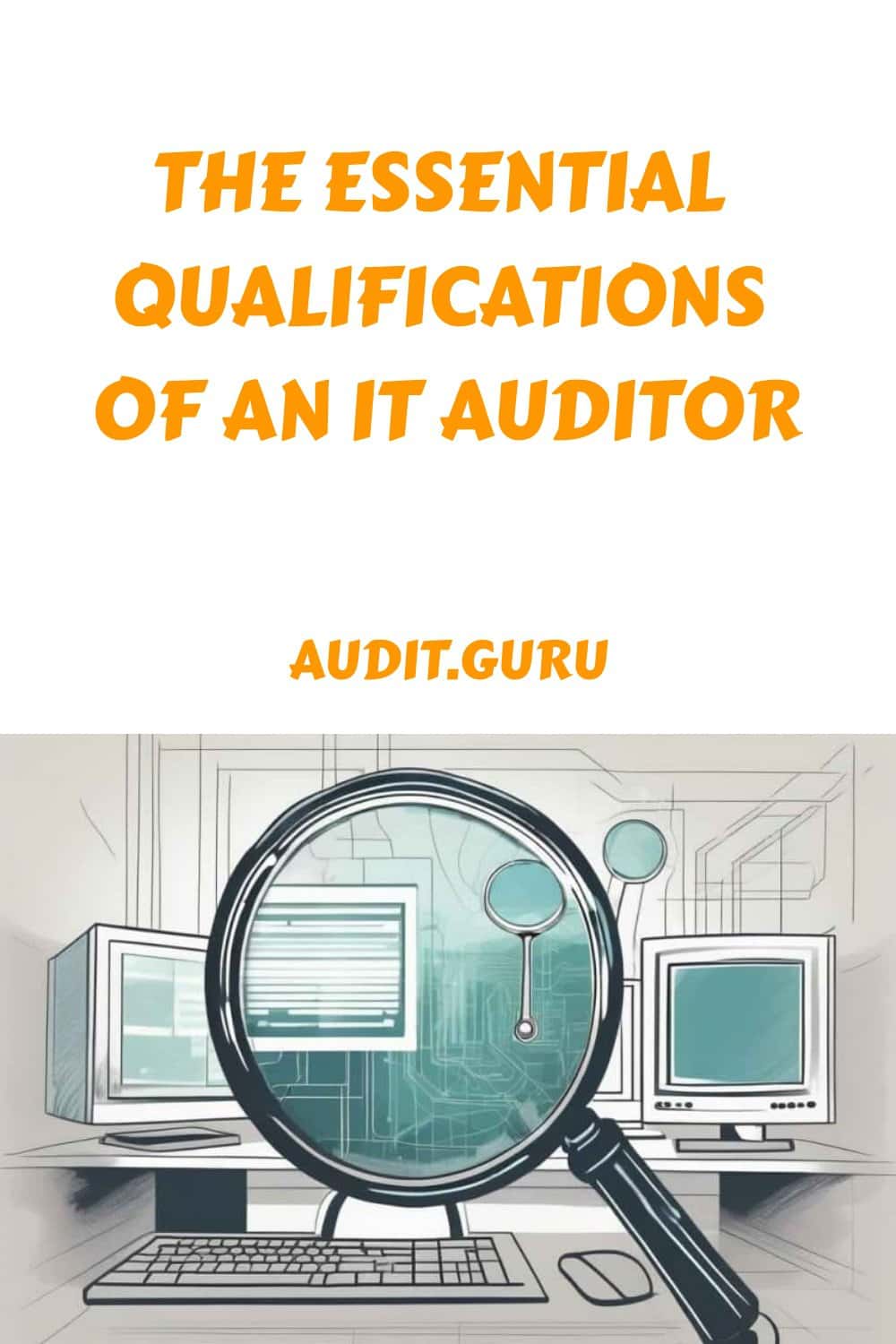
In today’s increasingly digitized world, the role of an IT auditor has become crucial in ensuring the security, integrity, and efficiency of information technology systems. As organizations rely heavily on technology to store and process sensitive data, the need for competent IT auditors has skyrocketed. This article will explore the qualifications and skills necessary to excel in this fieldand the future trends shaping IT auditing.
Understanding the Role of an IT Auditor
An IT auditor plays a vital role in assessing an organization’s IT infrastructure’s internal control systems and processes. Their primary objective is to identify any vulnerabilities or weaknesses that may expose the organization to risks such as data breaches, system failures, or compliance violations. By conducting thorough audits, IT auditors help ensure that the organization’s IT systems are effectively supporting its overall business objectives.
IT auditors are highly skilled professionals who possess a deep understanding of information technology, risk management, and internal controls. They are equipped with the knowledge and expertise to evaluate and analyze complex IT systems, networks, and applications. Through their assessments, IT auditors provide valuable insights and recommendations to enhance the security and efficiency of an organization’s IT environment.
Key Responsibilities of an IT Auditor
IT auditors are responsible for a range of tasks that encompass assessing the organization’s IT controls, identifying risks, and providing recommendations for improvement. Some of the key responsibilities of an IT auditor include:
- Evaluating the effectiveness of IT controls and processes
- Identifying potential risks and vulnerabilities in the IT infrastructure
- Testing the reliability and accuracy of data and information systems
- Assessing compliance with relevant laws, regulations, and industry standards
- Developing and implementing audit programs
When evaluating the effectiveness of IT controls and processes, IT auditors delve deep into the organization’s IT systems and infrastructure. They assess the design and implementation of controls, ensuring that they are operating effectively to mitigate risks. By identifying potential risks and vulnerabilities, IT auditors help organizations proactively address security gaps and strengthen their defenses against cyber threats.
IT auditors also play a crucial role in testing the reliability and accuracy of data and information systems. They verify the integrity of data by examining data sources, data flows, and data storage mechanisms. Through rigorous testing procedures, IT auditors ensure that the organization’s data is accurate, complete, and secure.
Furthermore, IT auditors assess compliance with relevant laws, regulations, and industry standards. They review the organization’s policies and procedures to ensure that they align with legal and regulatory requirements. By identifying any non-compliance issues, IT auditors help organizations avoid penalties, fines, and legal consequences.
Developing and implementing audit programs is another key responsibility of IT auditors. They create detailed plans and methodologies to guide the audit process. These programs outline the scope, objectives, and procedures for conducting audits, ensuring that all relevant areas are thoroughly examined. By following these programs, IT auditors maintain consistency and ensure that audits are conducted in a systematic and efficient manner.
The Importance of IT Auditors in Business
IT auditors play a critical role in safeguarding an organization’s IT assets and ensuring its data’s confidentiality, integrity, and availability. By conducting comprehensive audits, they provide management with valuable insights into the effectiveness of internal controls and the organization’s overall security posture. This helps prevent financial losses, reputational damage, and legal implications resulting from cyber-attacks, data breaches, or non-compliance with regulatory requirements.
Moreover, IT auditors contribute to the continuous improvement of an organization’s IT systems and processes. Organizations can enhance their IT controls, strengthen their security measures, and optimize their operations through their recommendations. By staying up-to-date with the latest technological advancements and industry best practices, IT auditors help organizations adapt to evolving threats and challenges in the digital landscape.
In conclusion, IT auditors play a crucial role in assessing and enhancing an organization’s IT infrastructure’s security, efficiency, and compliance. Their expertise and insights help organizations mitigate risks, protect valuable assets, and maintain a strong cybersecurity posture. By conducting thorough audits and providing valuable recommendations, IT auditors contribute to businesses’ overall success and resilience in today’s technology-driven world.
Educational Requirements for IT Auditors
While there is no one-size-fits-all educational path to becoming an IT auditor, certain qualifications and certifications can significantly enhance one’s chances of success in this field.
IT auditing is a specialized field that requires a strong educational background and a deep understanding of information systems, cybersecurity, and auditing principles. Most organizations prefer candidates with a bachelor’s or master’s degree in information systems, computer science, or a related field. These programs provide a solid foundation in IT concepts, data management, cybersecurity, and auditing principles.
Obtaining a professional certification is also highly recommended for aspiring IT auditors. Certifications such as Certified Information Systems Auditor (CISA), Certified Internal Auditor (CIA), or Certified Information Systems Security Professional (CISSP) can greatly enhance an auditor’s credibility and marketability. These certifications validate the auditor’s knowledge and expertise in the field, demonstrating their commitment to professional development and adherence to industry standards.
However, education and certifications are just the beginning of a successful career in IT auditing. The field is dynamic and constantly evolving, with new technologies, risks, and regulatory requirements emerging regularly. IT auditors must engage in continuous learning to stay ahead of these changes and ensure they provide value to their organizations.
Continuous learning in IT auditing can take various forms. IT auditors can attend workshops and seminars that focus on the latest industry trends, best practices, and emerging risks. These events provide opportunities to network with other professionals in the field and gain insights from experienced practitioners.
Industry conferences are another valuable resource for IT auditors. These conferences bring together experts from various sectors to discuss current challenges, share knowledge, and explore innovative solutions. Attending these conferences allows IT auditors to expand their knowledge base, learn from industry leaders, and stay updated on the latest technologies and regulatory requirements.
Pursuing advanced certifications is also an effective way for IT auditors to demonstrate their commitment to continuous learning. Advanced certifications, such as Certified Information Systems Auditor – Advanced (CISA-Advanced) or Certified in Risk and Information Systems Control (CRISC), provide specialized knowledge in specific areas of IT auditing, such as risk management or governance.
In conclusion, while a bachelor’s or master’s degree in information systems or computer science and professional certifications are essential for a career in IT auditing, continuous learning is equally important. By staying knowledgeable about the latest technologies, audit techniques, and regulatory requirements, IT auditors can add value to their organizations and keep their skills sharp.
Necessary Technical Skills for IT Auditors
Strong technical skills are fundamental for IT auditors to perform their duties effectively and identify potential risks and vulnerabilities within an organization’s IT systems.
IT auditors play a crucial role in ensuring the security and integrity of an organization’s IT infrastructure. They are responsible for evaluating the effectiveness of controls, assessing risks, and making recommendations for improvement. To carry out these tasks successfully, IT auditors must possess diverse technical skills.
Proficiency in IT Systems and Infrastructure
IT auditors must deeply understand various IT systems, platforms, and infrastructure components such as databases, networks, operating systems, and cloud environments. This knowledge enables auditors to assess security controls, identify weaknesses, and make informed recommendations for improvement.
Having a strong foundation in IT systems and infrastructure allows IT auditors to evaluate the design and implementation of controls effectively. They can assess the adequacy of security measures, such as firewalls and intrusion detection systems, and identify any vulnerabilities that may exist. By understanding the intricacies of different IT systems, auditors can provide valuable insights into potential risks and help organizations strengthen their overall security posture.
Understanding of Cybersecurity Principles
Given the ever-increasing threat landscape, IT auditors must understand cybersecurity principles and best practices. This includes knowledge of encryption, access controls, vulnerability management, incident response, and security governance frameworks such as NIST or ISO 27001. By evaluating an organization’s cybersecurity posture, IT auditors help mitigate risks and ensure the protection of sensitive data.
Cybersecurity is a critical aspect of IT auditing, as it directly impacts information confidentiality, integrity, and availability. IT auditors must be well-versed in the latest cybersecurity threats and trends to assess an organization’s security controls effectively. They must understand how different security measures work together to protect against potential attacks and be able to identify any gaps or weaknesses in the system.
Furthermore, IT auditors must stay up to date with emerging cybersecurity technologies and industry standards. This continuous learning ensures they have the knowledge and skills to address new and evolving threats effectively.
In conclusion, IT auditors must have technical skills to perform their role effectively. Proficiency in IT systems and infrastructure, combined with a solid understanding of cybersecurity principles, allows auditors to identify potential risks, evaluate controls, and provide valuable recommendations for improvement. By continuously enhancing their technical skills, IT auditors play a crucial role in safeguarding an organization’s IT systems and protecting sensitive data from potential threats.
Soft Skills for Success in IT Auditing
In addition to technical expertise, IT auditors must possess a range of soft skills to excel in their roles and effectively communicate audit findings to stakeholders.
Communication and Reporting Skills
Effective communication is vital for IT auditors to articulate complex technical concepts in a clear and concise manner to non-technical stakeholders. Strong written and verbal communication skills are essential for documenting audit findings, drafting reports, and presenting recommendations to management.
IT auditors must also have active listening skills to gather information and understand key business processes during audit engagements. By actively listening to stakeholders, IT auditors can gain valuable insights into the organization’s operations and identify potential risks or areas for improvement.
Furthermore, effective reporting skills are crucial for IT auditors to convey audit findings accurately and comprehensively. They must be able to present complex technical information in a way that is easily understandable to stakeholders, ensuring that the significance and implications of the findings are clear.
Analytical and Problem-Solving Abilities
IT auditors must be analytical thinkers with exceptional problem-solving abilities. They need to approach audit engagements with a critical mindset, analyzing systems, processes, and controls to identify potential weaknesses or vulnerabilities.
With their keen eye for detail, IT auditors can identify patterns, trends, and anomalies within large volumes of data. This ability allows them to assess the effectiveness of an organization’s controls and identify any deviations from established standards or best practices.
Furthermore, IT auditors employ various sampling techniques, such as statistical sampling, judgmental sampling, and attribute sampling, to gather evidence and draw conclusions about the organization’s controls. These techniques enable them to assess the reliability and accuracy of the data being audited, providing valuable insights into the overall control environment.
By combining their analytical and problem-solving abilities, IT auditors can provide meaningful recommendations to management, helping the organization enhance its control environment and mitigate potential risks.
The Path to Becoming an IT Auditor
For individuals aspiring to pursue a career as an IT auditor, understanding the path to success is essential. However, the journey to becoming an IT auditor is not straightforward. It requires a combination of education, practical experience, networking, and continuous professional development.
Entry-Level Positions and Career Progression
Many IT auditors begin their careers in entry-level positions, such as internal auditors, information security analysts, or IT consultants. These roles provide a solid foundation for individuals to gain practical experience in auditing methodologies, data analysis, and risk assessment. Working in these positions allows aspiring IT auditors to understand the inner workings of organizations and the challenges they face in managing their IT systems.
IT auditors can progress to more senior positions within their organizations as they acquire knowledge and skills. With experience, they can take on roles such as IT audit managers or directors, overseeing a team of auditors, and planning and executing IT audits. These senior positions require technical expertise and strong leadership and communication skills.
The Role of Networking and Professional Development
Networking plays a crucial role in the career advancement of IT auditors. Building relationships with professionals in the field, joining industry associations, and attending conferences provide opportunities for knowledge sharing, mentorship, and career growth. Networking allows IT auditors to stay updated on the latest trends and best practices in the industry and learn from the experiences of seasoned professionals.
Additionally, pursuing continuous professional development is essential for IT auditors to stay relevant in a rapidly evolving field. This can involve attending training programs, workshops, or seminars that focus on emerging technologies, cybersecurity, and regulatory compliance. Obtaining advanced certifications, such as the Certified Information Systems Auditor (CISA) or Certified Information Systems Security Professional (CISSP), demonstrates a commitment to professional growth and enhances an IT auditor’s credibility and marketability.
Furthermore, IT auditors can benefit from participating in professional organizations dedicated to the field of IT auditing. These organizations provide resources, networking opportunities, and access to industry events. They also offer certifications and continuing education programs specifically tailored to IT auditors, ensuring that professionals in this field have the necessary knowledge and skills to excel in their careers.
In conclusion, the path to becoming an IT auditor requires a combination of education, practical experience, networking, and continuous professional development. By starting in entry-level positions, gaining experience, and progressing to more senior roles, individuals can build a successful career in IT auditing. Networking and participating in professional development activities further enhance an IT auditor’s knowledge, skills, and professional credibility.
Future Trends in IT Auditing
As technology continues to evolve at a rapid pace, the future of IT auditing will be shaped by several key trends. These trends will impact the way audits are conducted and the skills and knowledge required of IT auditors.
The Impact of Emerging Technologies
Emerging technologies such as artificial intelligence, blockchain, and the Internet of Things (IoT) are transforming the business landscape and presenting new challenges for IT auditors. As organizations adopt these technologies, auditors must adapt their approaches to effectively evaluate the associated risks and controls.
For example, with the rise of artificial intelligence, auditors need to understand how machine learning algorithms are being used to automate processes and make decisions. They must assess the reliability and integrity of these algorithms, ensuring that they are free from biases and errors that could lead to incorrect outcomes.
Similarly, the adoption of blockchain technology introduces the need for auditors to understand the intricacies of decentralized ledgers. They must evaluate the security and transparency of blockchain networks, ensuring that transactions are recorded accurately and cannot be tampered with.
Furthermore, the proliferation of the Internet of Things devices presents auditors with the challenge of assessing the security and privacy risks associated with interconnected devices. They must evaluate the controls in place to protect sensitive data and prevent unauthorized access.
To effectively address these challenges, IT auditors must stay abreast of technological advancements and continuously update their audit methodologies. They need to develop a deep understanding of emerging technologies and their implications for business processes and controls.
The Evolving Regulatory Landscape in IT Auditing
Regulatory requirements related to data privacy, cybersecurity, and information governance are becoming increasingly stringent. IT auditors must stay ahead of evolving regulations to ensure compliance and provide assurance to organizations and their stakeholders.
For instance, the General Data Protection Regulation (GDPR) has introduced strict rules for collecting, storing, and processing personal data. IT auditors must assess whether organizations have implemented appropriate measures to protect personal data and comply with GDPR requirements.
In addition to GDPR, auditors must also consider other regulations, such as the California Consumer Privacy Act (CCPA) and the Health Insurance Portability and Accountability Act (HIPAA). These regulations impose specific requirements on organizations handling consumer data and protected health information.
By keeping a pulse on regulatory changes and industry standards, IT auditors can help mitigate risks and ensure adherence to legal and ethical obligations. They must comprehensively understand the regulatory landscape and collaborate closely with legal and compliance teams to ensure effective compliance programs.
Furthermore, IT auditors need to possess strong communication and collaboration skills to engage with stakeholders and explain complex regulatory requirements effectively. They must be able to translate technical jargon into business language, enabling organizations to make informed decisions and take appropriate actions.
Conclusion
In conclusion, becoming a successful IT auditor requires a combination of technical expertise, soft skills, and continuous learning. By possessing the necessary qualifications and staying knowledgeable about emerging technologies and regulatory requirements, IT auditors can add significant value to their organizations by safeguarding data, mitigating risks, and ensuring the effectiveness of IT controls.








